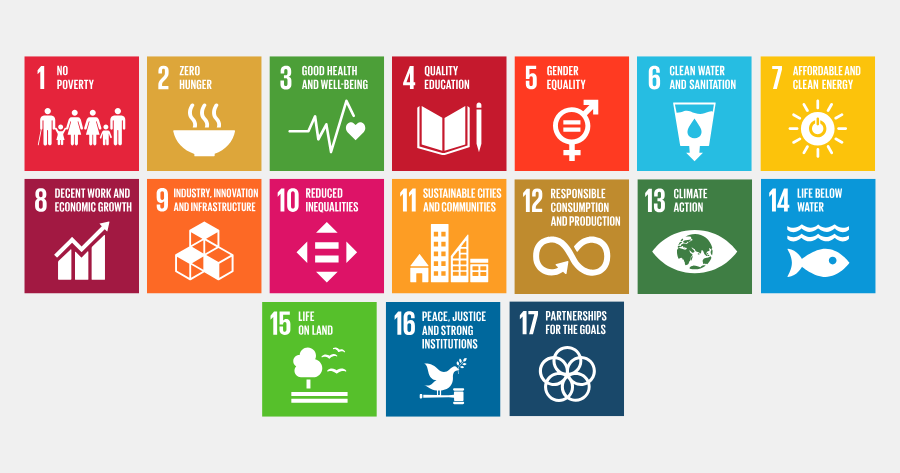เป้าหมายการพัฒนาที่ยั่งยืน (Sustainable Development Goals: SDGs) คือกรอบแนวทางการพัฒนาระดับโลกที่องค์การสหประชาชาติประกาศใช้ในปี ค.ศ. 2015 เพื่อเป็นแผนปฏิบัติการร่วมกันของประชาคมโลกในการสร้างอนาคตที่ดีขึ้นให้กับทุกคน โดยกำหนดเป้าหมายจำนวน 17 ข้อ ครอบคลุมมิติสำคัญทั้งด้านเศรษฐกิจ สังคม สิ่งแวดล้อม และการบริหารจัดการทรัพยากร เพื่อให้การพัฒนามีความสมดุล เป็นธรรม และยั่งยืน โดยมีเป้าหมายชัดเจนตั้งแต่การขจัดความยากจนและความหิวโหย ไปจนถึงการรับมือกับการเปลี่ยนแปลงสภาพภูมิอากาศ และการสร้างความร่วมมือระดับโลก
เป้าหมายการพัฒนาที่ยั่งยืน (SDGs: 17 Goals) 
1. ขจัดความยากจน (No Poverty) : สร้างสังคมที่ปราศจากความยากจนทุกระดับ เพื่อให้ทุกคนมีคุณภาพชีวิตที่ดีและโอกาสที่เท่าเทียม
Keyword: poverty, income distribution, wealth distribution, socio economic, socio-economic, socioeconomic, homeless, low-income, low income, affordable, disparity, welfare, social safety, developing country, vulnerability, precarity, precarious, pro-poor

2. ขจัดความหิวโหย (Zero Hunger) : สร้างความมั่นคงทางอาหาร โภชนาการที่ดี และสนับสนุนเกษตรกรรมที่ยั่งยืน
Keyword: agriculture, nutrition, food security, food insecurity, food-secure, food system, child hunger, food justice, food scarcity, food sovereignty, food culture, culinary, agro, permaculture, indigenous crops, regenerative agriculture, urban agriculture, organic food, biodynamic, food literacy, food education, benefit sharing, access and benefit sharing (ABS), malnutrition, end hunger, food price, zero hunger

3.มีสุขภาพและความเป็นอยู่ที่ดี (Good Health and Well-being) : ส่งเสริมให้ทุกคนมีสุขภาพแข็งแรง ลดการเจ็บป่วยและการเสียชีวิตที่สามารถป้องกันได้
Keyword: well being, wellbeing, well-being, mental health, public health, global health, health care, healthcare, health issues, mental wellness, disability, sexual education, mindfulness, holism, illness, health education, communicable disease, health determinants, vaccine, substance abuse, maternal mortality, family planning, hazardous chemicals, pollution, health equity, neonatal mortality, infant mortality, child health, road traffic accidents, reproductive health, epidemics, universal health coverage

4.การศึกษาที่มีคุณภาพ (Quality Education) : สร้างโอกาสการศึกษาอย่างเท่าเทียมและคุณภาพสูงสำหรับทุกคน
Keyword: equitable, pedagogy, knowledge, worldview, learning, knowledges, traditional knowledge, land-based knowledge, place-based knowledge, decolonial, anticolonial, settler, equitable, equity, anti-racism, racism, anti-oppression, oppression, anti-discriminatory, early childhood, development, peace, citizen, sustainability teaching, sustainability education, universal literacy, basic literacy, universal numeracy, environmental education, education for sustainable development, ecojustice education, place-based education, humane education, land-based learning, nature-based education, climate change education, vocational, technical learning, free education, accessible education, primary education, secondary education, tertiary education

5.ความเท่าเทียมทางเพศ (Gender Equality) : ขจัดการเลือกปฏิบัติ ส่งเสริมสิทธิและบทบาทของสตรีและเด็กผู้หญิงอย่างเท่าเทียม
Keyword: gender, women, girl, queer, female, feminis, non-binary, non binary, sexes, LGBTQ, patriarchy, transgender, two-spirit, gender equality, violence against women, trafficking, forced marriage

6.น้ำสะอาดและการสุขาภิบาล (Clean Water and Sanitation) : รับรองว่าทุกคนเข้าถึงน้ำสะอาดและระบบสุขาภิบาลที่ปลอดภัย
Keyword: water, Sanita, contamination, arid, drought, hygiene, sewage water scarcity, remediation, untreated wastewater, water harvesting, desalination, water efficiency, groundwater depletion, desertification, water filtration, latrines, open defecation, hydrological cycle, water and energy nexus, stormwater management, low impact development, green infrastructure, living infrastructure water education

7.พลังงานสะอาดที่ทุกคนเข้าถึงได้ (Affordable and Clean Energy) : ส่งเสริมพลังงานสะอาดที่เชื่อถือได้ ราคาย่อมเยา และเป็นมิตรต่อสิ่งแวดล้อม
Keyword: energy, renewable, wind, solar, geothermal, hydroelectric, fuel efficient, fuel-efficient, carbon capture, emission, greenhouse, biofuel; energy sovereignty, energy security, energy education

8.การจ้างงานที่มีคุณค่าและการเติบโตทางเศรษฐกิจ (Decent Work and Economic Growth) : สร้างโอกาสการจ้างงานที่เป็นธรรม ส่งเสริมเศรษฐกิจที่เติบโตอย่างยั่งยืน
Keyword: employment, economic growth, sustainable development, labour, labor, worker, wage, economic empowerment, entrepreneur, small-and medium-sized enterprises, SMEs, sustainable tourism, youth employment, green job, economic recovery, green growth, sustainable growth

9.โครงสร้างพื้นฐาน นวัตกรรม และอุตสาหกรรม (Industry, Innovation and Infrastructure) : พัฒนาโครงสร้างพื้นฐาน สร้างนวัตกรรม และส่งเสริมอุตสาหกรรมที่ยั่งยืน
Keyword: infrastructure, buildings, capital, invest, internet, globalize, globalism, Industrialization, value chain, affordable credit, industrial diversification

10.ลดความไม่เสมอภาค (Reduced Inequalities) : ลดช่องว่างความเหลื่อมล้ำในด้านเศรษฐกิจ สังคม และโอกาส
Keyword: trade, inequality, financial market, taxation, equity, equality, humanitarian, minority, refugee, BIPOC, of color, of color, indigenous, reconciliation, truth and reconciliation, underserved, privileged, affordable, equal access, marginalized, marginalized, impoverished, vulnerable population, social safety, social security, government program, disparity, income, Gini, anti-oppressive, anti-racist, anti-discriminatory, decolonization

11.เมืองและถิ่นฐานมนุษย์อย่างยั่งยืน (Sustainable Cities and Communities) : สร้างเมืองและชุมชนที่ปลอดภัย ยืดหยุ่น และเป็นมิตรต่อสิ่งแวดล้อม
Keyword: cities, urban, resilience, rural, sustainable development, public transport, metro, housing green infrastructure, low impact development, climate change adaptation, climate change mitigation, green buildings, affordable housing, walkable, transit, civic spaces, open spaces, accessible, indigenous placemaking, indigenous placekeeping

12.การผลิตและการบริโภคที่ยั่งยืน (Responsible Consumption and Production) : ใช้ทรัพยากรอย่างมีประสิทธิภาพ ลดของเสียและมลพิษ สนับสนุนการผลิตที่เป็นมิตรต่อสิ่งแวดล้อม
Keyword: consume, production, waste, natural resource, recycle, industrial ecology, sustainable design, supply chain, outsourcing, offshore, reuse, decarbonize, decarbonize, carbon tax, carbon pricing, food waste, public procurement, fossil fuel subsidies

13.การรับมือการเปลี่ยนแปลงสภาพภูมิอากาศ (Climate Action) : ลดผลกระทบและปรับตัวต่อการเปลี่ยนแปลงสภาพภูมิอากาศ
Keyword: climate, greenhouse gas, global warming, weather, environmental, planet, vegan, vegetarian, anthropogenic, fossil fuel, emissions, carbon dioxide, CO2, carbon-neutral, carbon neutral, net zero, net-zero, methane, sea level, climate change mitigation, climate change adaptation, climate impacts, climate scenarios, climate solutions, climate justice, global climate models carbon capture, carbon sequestration, low carbon, resilience, Anthropocene, climate positive, offsets, carbon trading, carbon markets, UNFCCC, climate finance, loss and damage, Paris

14.การใช้ประโยชน์จากทรัพยากรทางทะเลอย่างยั่งยืน (Life Below Water) : อนุรักษ์และใช้ประโยชน์จากมหาสมุทรและทรัพยากรทางทะเลอย่างยั่งยืน
Keyword: ocean, marine, pollution, conserve, fish, natural habitat, species, animal, biodiversity, coral, maritime, ocean literacy ecosystem, overfish, fish stocks, ocean, sustainable use, traditional use

15.การใช้ประโยชน์จากระบบนิเวศบนบกอย่างยั่งยืน (Life on Land) : ปกป้อง ปรับปรุง และใช้ประโยชน์จากทรัพยากรบนบก ป่าไม้ และความหลากหลายทางชีวภาพ
Keyword: forest, biodiversity, ecology, pollution, conserve, land use, natural habitat, species, animal, regeneration, resilience, sustainable and traditional use, land ecological restoration, forest conservation, carbon sequestration, carbon capture, soil, erosion, habitat loss, endangered species ecosystem, deforestation, reforestation, wildlife, flora and fauna, benefit sharing

16.สันติภาพ ความยุติธรรม และสถาบันที่เข้มแข็ง (Peace, Justice and Strong Institutions) : ส่งเสริมสังคมที่สงบสุข ยุติธรรม และมีสถาบันที่โปร่งใส
Keyword: institut, governance, peace, social justice, injustice, criminal justice, human rights, democratic rights, voter rights, legal system, social change, corrupt, nationalism, democra, authoritarian, indigenous, judic, ecojustice, indigenous rights, self-determinationsovereigntyviolence, exploitation, trafficking, torture, rule of law, illicit, organized crime, bribe, terroris, prior and informed consent, access and benefit sharing, UNDRIP (United Nations Declaration on Rights of Indigenous Peoples), indigenous rights

17.ความร่วมมือเพื่อการพัฒนาที่ยั่งยืน (Partnerships for the Goals) : สร้างความร่วมมือระดับโลก ทั้งภาครัฐ เอกชน และประชาสังคม เพื่อขับเคลื่อน SDGs
Keyword: Global Partnership, International Cooperation, Multi-stakeholder Collaboration, Capacity Building, Technology Transfer, Finance and Investment, Trade Facilitation, Policy Coherence, Knowledge Sharing, Sustainable Development Financing, North-South Cooperation, South-South Cooperation, Global Solidarity

คณะเทคโนโลยีและนวัตกรรมผลิตภัณฑ์การเกษตรมีบทบาทสำคัญในการขับเคลื่อน SDGs โดยเฉพาะเป้าหมายที่เกี่ยวข้องกับ ความมั่นคงทางอาหารและโภชนาการ (SDG 2), การส่งเสริมสุขภาพ (SDG 3), การวิจัยและนวัตกรรมด้านเกษตรและอาหาร (SDG 9), การผลิตและการบริโภคที่ยั่งยืน (SDG 12) รวมถึง การรับมือกับการเปลี่ยนแปลงสภาพภูมิอากาศ (SDG 13) ผ่านการวิจัยและพัฒนาผลิตภัณฑ์เกษตรที่มีมูลค่าเพิ่ม การใช้ทรัพยากรอย่างคุ้มค่า และการนำนวัตกรรมสีเขียวมาประยุกต์ใช้ในกระบวนการผลิต
นอกจากนี้ คณะยังได้กำหนดยุทธศาสตร์ด้านการเรียนการสอน การวิจัย และการบริการวิชาการ ที่มุ่งสร้าง องค์ความรู้ใหม่ และ นวัตกรรมเชิงพาณิชย์ เพื่อตอบโจทย์เกษตรอัจฉริยะและเศรษฐกิจหมุนเวียน (Circular Economy) ซึ่งสอดคล้องโดยตรงกับเป้าหมาย SDGs หลายข้อ ทั้งในปัจจุบันและอนาคต ขอบเขตการวิจัยในอนาคตจะมุ่งเน้นการสร้างเทคโนโลยีที่ลดผลกระทบต่อสิ่งแวดล้อม สนับสนุนการพัฒนาผลิตภัณฑ์ที่ปลอดภัยต่อผู้บริโภค และสร้างเครือข่ายความร่วมมือกับภาคส่วนต่าง ๆ เพื่อร่วมกันผลักดันโลกเกษตรกรรมสู่ความยั่งยืน
การระบุคำสำคัญ (Key Words) ที่ใช้ในผลงานวิจัย เพื่อจัดกลุ่มงานวิจัยให้อยู่ในเป้าหมาย การพัฒนาที่ยั่งยืน (Sustainable Development Goals) บนฐานข้อมูล Scopus
ตามพันธกิจของมหาวิทยาลัยศรีนครินทรวิโรฒ ที่มุ่งเน้นการสร้างสรรค์งานวิจัยและนวัตกรรมที่มีคุณภาพ และก่อให้เกิดประโยชน์อย่างยั่งยืนต่อสังคมทั้งในระดับชาติและนานาชาติ สถาบันยุทธศาสตร์ทางปัญญาและวิจัยได้ดำเนินการรวบรวมคำสำคัญ (Keywords) ที่ปรากฏในผลงานวิจัย เพื่อนำมาจัดกลุ่มงานวิจัยให้สอดคล้องกับ เป้าหมายการพัฒนาที่ยั่งยืน (Sustainable Development Goals: SDGs) บนฐานข้อมูล Scopus ทั้งนี้สามารถศึกษารายละเอียดเพิ่มเติมได้จากลิงก์ด้านล่าง
ในการนี้ สถาบันยุทธศาสตร์ทางปัญญาและวิจัย ขอความอนุเคราะห์จากท่านในการประชาสัมพันธ์และส่งเสริมให้นักวิจัยเพิ่มคำสำคัญ (Keywords) ที่เกี่ยวข้องลงในผลงานวิจัยที่ได้รับการตีพิมพ์ในระดับนานาชาติ เพื่อให้สามารถจัดกลุ่มเข้าสู่เป้าหมายการพัฒนาที่ยั่งยืน (SDGs) บนฐานข้อมูล Scopus ได้อย่างมีประสิทธิภาพต่อไป